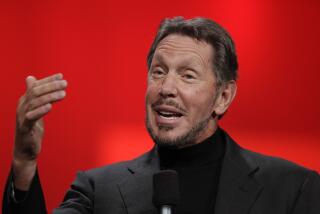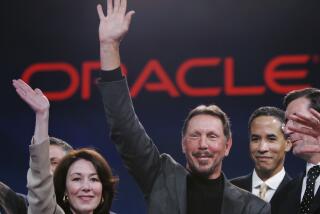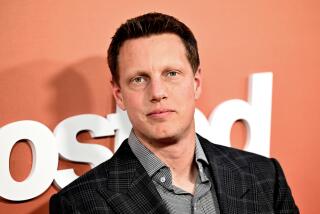THE INFORMATION SUPERHIGHWAY : Oracle Seeks Role in the Fast Lane : Multimedia: Its interactive TV deal with Bell Atlantic is a milestone in a well-orchestrated campaign.
- Share via
Centuries ago, pilgrims trekked to central Greece to consult the Oracle at Delphi. Recently, multimedia pilgrims have been beating a path to the door of Lawrence J. Ellison, whose Oracle Corp. is emerging as a pivotal player of the Information Age.
In a well-orchestrated campaign, the oracle of Oracle has for months been laying out his vision for offering video on demand, home shopping and other services.
Wednesday, Oracle Corp. confirmed that it will provide crucial multimedia software for Bell Atlantic Corp.’s planned interactive television services as part of a wide-ranging alliance between the two firms.
The contract, much coveted among technology firms vying for a foothold in the nation’s new interactive communications network, presages a slew of alliances with broadcasting and media firms that Oracle is expected to announce next week. What Oracles wants to do is provide the core software driving the new communications networks.
“This is a very significant announcement,” said Jonathan Seybold, publisher of Digital Media, a San Francisco newsletter. “Oracle wants to be for the information superhighway what Microsoft and Intel were to the PC industry.”
Already the largest provider of database software for corporate America--with 40% of the market--Oracle, based in Redwood Shores, south of San Francisco, now wants to provide that same software for everyone.
Ellison, the firm’s college dropout-cum-billionaire founder and chief executive, has lately been jockeying to position Oracle’s database software as the key to the Multimedia Age--with mixed results. Several other phone and cable companies have chosen Ellison’s competition for their interactive trials. And Hollywood has been an especially hard sell.
The company has scheduled a demonstration Tuesday at CBS Studios in Los Angeles--to be beamed by satellite to New York, Washington, Tokyo and London--of how home shopping, ordering movies on demand and interactive learning applications might look on a TV screen using its technology. Designed largely to pique the entertainment industry’s interest, the event will include several celebrity “featured guests.” Veteran news anchor Walter Cronkite, movie critics Gene Siskel and Roger Ebert and Malcolm Forbes Jr. are among those scheduled to appear.
“I think everybody and his cousin is invited,” said Jorg Agin, senior vice president of new technology and business development at MCA.
Such elaborate courting may be necessary for Hollywood because of the widespread belief among entertainment executives that so long as they keep making movies and TV shows that people want to see, the information superhighway will be sure to run by their door.
“The studios own the content and there isn’t anything anyone can do about it,” said Warner Bros. senior business analyst Steve Brisk, who has listened to Oracle’s pitch recently.
Terry Garnett, Oracle’s senior vice president of new media, who has been knocking on every major media company’s door since last fall, says it makes economic sense for entertainment firms to store their films and programming on their own media servers, using Oracle’s expertise in database software development to create their own applications.
Key to Oracle’s strategy is its so-called media-server technology. Able to keep track of mountains of videos, music, magazines, catalogue offerings and other information, Oracle’s software would run on unorthodox computers made by nCube, a Foster City company that Ellison controls.
Conventional machines, even the powerful ones made by Silicon Graphics, are limited by a central memory bank. They can deliver movies to only 1,000 or 2,000 viewers at a time. But the so-called massively parallel computers made by nCube have thousands of modules, each with its own memory. Each can retrieve digitized pieces of movies and “serve them up” to a subscriber’s TV. With these machines, tens of thousands--or ultimately millions--of viewers could order the same movie at once.
But while industry analysts have reacted favorably to Oracle’s newest offerings, the company has a reputation for promising more than it can deliver. At Tuesday’s “superhighway summit” at UCLA, for example, several entertainment executives were struck by Ellison’s unbridled optimism about the coming of the much-heralded highway, in contrast to other panelists.
Perhaps with that in mind, Bell Atlantic multimedia President Arthur Bushkin sought to play down expectations Wednesday of how the server technology will perform later this year during the first phase of the phone company’s interactive network.
“Everyone shares the vision, but we have to be mindful that the vision won’t happen overnight,” Bushkin said.







